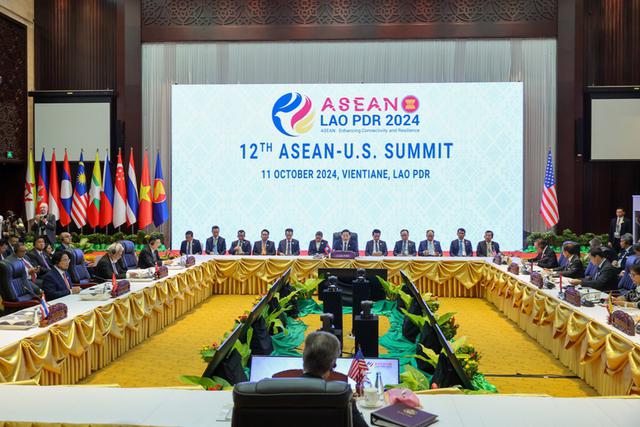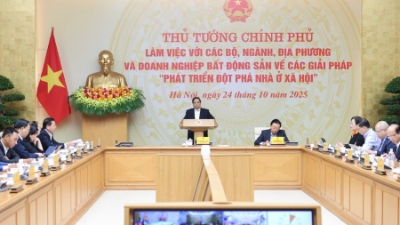Prime Minister Pham Minh Chinh and leaders of other ASEAN member countries and US Secretary of State Anthony Blinken attended the 12th ASEAN-US Summit, hosted by Laos on October 11.
At the summit, held in Vientiane capital, Vietnam highly valued the significance of the ASEAN-US comprehensive strategic partnership, and expected that the US will continue to deeply, extensively, and actively engage in the region, maintaining its responsible and long-term commitments to the grouping, and supporting ASEAN in community building and promoting its central role in shaping a regional architecture of open, inclusion, and transparency with respect to international law, according to the Vietnam News Agency.
The news agency quoted PM Chinh as proposing that the two sides strengthen cooperation for a prosperous and sustainable future, taking economic, trade, and investment collaboration as the focal point and the driving force that needs to be bolstered in an effective, harmonious, and sustainable manner.
Besides, it is necessary to promote cooperation in responding to climate change and enhancing resilience against natural disasters, PM Chinh said, as quoted by the news agency, underlining that Vietnam welcomes the US to continue supporting the development of the Mekong sub-region through the Mekong-US Partnership framework, including enhancing resilience to climate change in Vietnam's Mekong Delta region.
Vietnam also suggested the increase of efforts and allocation of appropriate resources to make science, technology, and innovation cooperation a new pillar in the US-ASEAN relationship, opening up a new development space and creating breakthroughs to promote the rapid and sustainable development of the comprehensive strategic partnership between the two sides. Vietnam also welcomes cooperation opportunities with US corporations and technology companies, especially in the fields of semiconductor industry and AI, the news agency reported.
Vietnam proposed that ASEAN and the US strengthen coordination and make more contributions to peace, security, and stability in the region. It asked the US to continue its support to ASEAN's common stance on the East Sea and coordination to ensure peace, security, and stability in the region, including the East Sea, and support to efforts to reach an effective and substantive Code of Conduct in the East Sea (COC) at an early date in accordance with international law, especially the 1982 United Nations Convention on the Law of the Sea (UNCLOS), contributing to turning the East Sea into a sea of peace, stability, cooperation, and sustainable development.
Meanwhile, according to the news agency, US Secretary of State Anthony Blinken affirmed that ASEAN holds a central position in his country’s vision of an open, secure, and prosperous Indo-Pacific, and highly valued the importance of the ASEAN-US comprehensive strategic partnership and the significance of promoting connectivity of economic cooperation opportunities and innovative technology, creating more jobs, and bringing a better life to 1 billion people on both sides.
Mr. Blinken emphasized that the US will continue to cooperate with and support ASEAN in disease prevention, upgrading the regional power grid, preventing cybercrime and online fraud, promoting safe, secure and trustworthy artificial intelligence (AI), as well as promoting cultural exchanges. He expressed his delight to see that the Young Southeast Asian Leaders Initiative has by now, 10 years after its establishment, seen an expanding membership.
Participants hailed the US’s strong and long-term commitment to ASEAN and the region over the years, its support for ASEAN's central role, as well as its active participation in constructive dialogue, cooperation, and trust building in the region. They welcomed the US’s support to ASEAN in building the ASEAN Community, integrating, connecting, developing the sub-region, narrowing the development gap and responding to challenges, including through the Mekong-US Partnership (MUSP) framework.
The leaders welcomed recent positive developments in bilateral cooperation, with the ASEAN-US Action Plan for the 2021-2025 completed by 98.37%. In 2023, the US was ASEAN's largest investor with more than 6,200 US businesses operating in ASEAN whose combined investment totaling $74.3 billion, they noted, adding that the US is also ASEAN's second largest trading partner with a total two-way trade of $395.9 billion.
Economic initiatives such as the ASEAN-US Trade and Investment Framework Agreements (TIFA) and the US-ASEAN Expanded Economic Engagement (E3) have provided a basis for promoting cooperation in areas such as the digital economy, small and medium enterprise development, and trade facilitation, according to the participants.
The two sides agreed that in the coming time, they will continue to promote cooperation in a substantive and effective manner to match their strategic comprehensive partnership, with priority to promoting trade, investment, science and technology, innovation, digital transformation, AI governance, health care, energy, environment, and climate change response, contributing to the rapid, sustainable, and long-term development of the region.
Concluding the summit, leaders of ASEAN and the US adopted the ASEAN-US Leaders’ Statement on promoting safe, secure, and trustworthy artificial intelligence.









 Google translate
Google translate